Loss
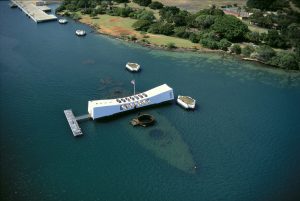 Probably the most notable memorials of the December 7, 1941 attack on Pearl Harbor, is the Arizona Memorial, which floats atop the sunken ship USS Arizona, which sank during that attack, taking with it 1,177 men. In all, the Japanese attack on Pearl Harbor, took the lives of 1998 navy personnel, 109 Marines, 233 army personnel and 48 civilians that were killed in that bombing which resulted in 2,402 soldiers killed and 1,282 military personnel and civilians wounded. Over half of the fatalities of that dreadful day occurred on the USS Arizona.
Probably the most notable memorials of the December 7, 1941 attack on Pearl Harbor, is the Arizona Memorial, which floats atop the sunken ship USS Arizona, which sank during that attack, taking with it 1,177 men. In all, the Japanese attack on Pearl Harbor, took the lives of 1998 navy personnel, 109 Marines, 233 army personnel and 48 civilians that were killed in that bombing which resulted in 2,402 soldiers killed and 1,282 military personnel and civilians wounded. Over half of the fatalities of that dreadful day occurred on the USS Arizona.
The USS Arizona had one more situation that would make it unique…in a tragic way. There were 38 sets of brother stationed on the USS Arizona. The brothers totaled 79 men. Of these 79 brothers, 63 lost their lives that day. There were three sets of three brothers: the Beckers, the Dohertys, and the Murdocks. Only one of each of the sets of three survived. Of the 38 sets of brothers on the USS Arizona, 23 complete sets were lost. There was also a father/son set on the USS Arizona…both of whom were killed in the attack. This is in no way to say that any of the other people killed in the Pearl Harbor attack of December 7, 1941 were less important that these brothers or the father and son set, because they weren’t. Every person that served when out nation was brutally attacked that day, gave their lives for their country. The brothers serving was unusual, in that the military tries not to place siblings together, 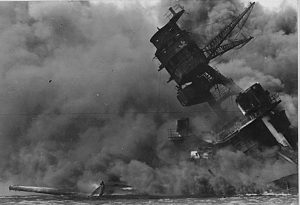 lest they both be killed, but these men requested this. They liked having their brother there with them. I can understand that. Long months away from family can be very lonely.
lest they both be killed, but these men requested this. They liked having their brother there with them. I can understand that. Long months away from family can be very lonely.
The explosion and subsequent fires on the USS Arizona killed 1,177 sailors and marines instantly. The entire front portion of the ship was destroyed, because the fire burned everything in its path. To make matters worse, the fires continued for 2½ days, causing the bodies that were there to be cremated before anyone could located and removed. Out of a crew of 1,511 men on the USS Arizona, only 334 survived. Of the dead, only 107 were positively identified, due to the immense fire. The remaining 1,070 casualties fell into three categories: (1) Bodies that were never found; (2) Bodies that were removed from the ship during salvage operations and were severely dismembered or partially cremated that identification was impossible. DNA testing was unheard of in 1941. These bodies were placed in temporary mass graves, and later moved and reburied and marked as unknowns, at the National Memorial Cemetery of the Pacific (Punchbowl) in 1949; and (3) Bodies located in the aft (rear) portion of the ship. These remains could have been recovered, but were left in the ship due to their unidentifiable condition. The injuries to these bodies indicated that most of these crew members died from the concussion from the massive explosion.
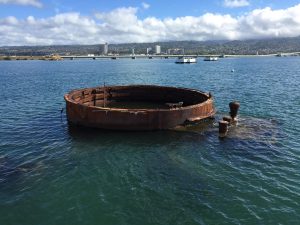 Everyone of the people who lost their lives on December 7, 1941, at Pearl Harbor, were heroes. Their families were left to mourn their loss, mostly without the closure that can be found when there is a body to bury. The horrific attack marked the inevitable entrance of the United States into World War II, and if the Japanese thought they could beat the United States with this sneak attack, they soon found out just how wrong they were. They had awakened the “sleeping giant” and they would be sorry they did. Today we honor all those who dies at Pearl Harbor, but also, all who survived and went forward to avenge their fallen comrades. We will never forget their sacrifice. We are forever grateful.
Everyone of the people who lost their lives on December 7, 1941, at Pearl Harbor, were heroes. Their families were left to mourn their loss, mostly without the closure that can be found when there is a body to bury. The horrific attack marked the inevitable entrance of the United States into World War II, and if the Japanese thought they could beat the United States with this sneak attack, they soon found out just how wrong they were. They had awakened the “sleeping giant” and they would be sorry they did. Today we honor all those who dies at Pearl Harbor, but also, all who survived and went forward to avenge their fallen comrades. We will never forget their sacrifice. We are forever grateful.
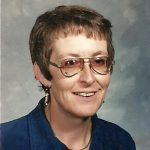 Our aunt, Linda Cole was the middle child of my husband, Bob’s Grandma and Grandpa Knox. She and her husband, Bobby moved to Kennebec, South Dakota early in their marriage, and raised their two children, Sheila Gregory and Patrick Cole. In Kennebec, Linda and Bobby owned a hotel, and when people came to visit, they always had enough room for everyone to stay. My husband, Bob and I took our girls, Corrie Petersen and Amy Royce to visit them once a year. It was a nice trip for us and they got to see family too. Running a hotel didn’t leave much time to travel, so the family that came to visit them was often the only time the saw the rest of us. Linda’s sister, Joann Schulenberg and her husband, Walt, my in-laws went often too. We all went in the summer, so it was often really hot in Kennebec. Nevertheless, the visits were fun, and I will always be glad we went.
Our aunt, Linda Cole was the middle child of my husband, Bob’s Grandma and Grandpa Knox. She and her husband, Bobby moved to Kennebec, South Dakota early in their marriage, and raised their two children, Sheila Gregory and Patrick Cole. In Kennebec, Linda and Bobby owned a hotel, and when people came to visit, they always had enough room for everyone to stay. My husband, Bob and I took our girls, Corrie Petersen and Amy Royce to visit them once a year. It was a nice trip for us and they got to see family too. Running a hotel didn’t leave much time to travel, so the family that came to visit them was often the only time the saw the rest of us. Linda’s sister, Joann Schulenberg and her husband, Walt, my in-laws went often too. We all went in the summer, so it was often really hot in Kennebec. Nevertheless, the visits were fun, and I will always be glad we went.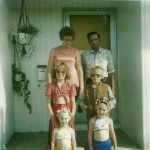
Later, after a fire burned most of the hotel down, the family moved to Winnemucca, Nevada, where Linda and Bobby both found work in the casinos. They really liked working there and also enjoyed gambling on their days off. I don’t know how they fared in their gambling, but they didn’t really spend a huge amount of time at it. They liked the warmth and easy winters, and enjoyed the place they had out in the country. It was quiet, and that was nice after the noise of the casinos.
My in-laws visited them periodically in their travels as snowbirds, and the sisters got to know each other again. For so many years they had lived far away from each 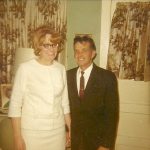 other, that they were more like acquaintances than sisters sometimes. The girls’ younger sister, Margee lives here in Casper. She and Linda talked on the telephone often, and they were very close. It was hard on the sisters to be so far away from Linda, but as time goes on, you get used to things.
other, that they were more like acquaintances than sisters sometimes. The girls’ younger sister, Margee lives here in Casper. She and Linda talked on the telephone often, and they were very close. It was hard on the sisters to be so far away from Linda, but as time goes on, you get used to things.
In May of 2014, Linda lost her husband, Bobby, and then Linda passed away in September of 2016. It had been a number of years since her sisters had seen Linda, and that made her passing especially sad. It always seemed as if there would be time, but when time ran out, it left only sadness where Linda had been. We can only look forward to seeing her again in Heaven. Today would have been Linda’s 73rd birthday. Happy birthday in Heaven, Linda. We love and miss you very much.
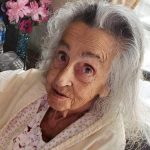
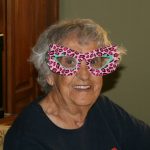 Very early this morning, a beautiful lady went to Heaven. Aunt Virginia Beadle was first and foremost a mother to her children. She loved each and every one of them so much, and always considered herself to be very blessed by her children and later her children’s spouses. She enjoyed every one of her grandchildren, and her last granddaughter was named after the daughter Aunt Virginia lost in 1967…Christy. Aunt Virginia loved children…of all ages. In her early live, she and her first husband adopted a son, Forrest, and she loved him dearly. He passed away in 2005, and the loss was devastating to her. After the loss of these two children, she focused her life on the rest of her kids, and any others that she could help. She was truly a great woman, often known by those she helped as the “patron saint of lost children.” Over the years, she took in so many kids. It didn’t matter what their need was. They might be troubled, drugged out, or lost…it didn’t matter to her. She was there to help in any way she could. She always looked for the good in people, and I don’t know of anyone in whom she could find no good. Those who knew her, her kids, grandkids, and her nieces and nephews loved her dearly. My cousin Elmer Johnson spent time with her when he could over the years…probably more than most of the nieces and nephews did. When he lost his own parents, Elmer and Delores Johnson, I’m sure she was there to help ease the pain. That
Very early this morning, a beautiful lady went to Heaven. Aunt Virginia Beadle was first and foremost a mother to her children. She loved each and every one of them so much, and always considered herself to be very blessed by her children and later her children’s spouses. She enjoyed every one of her grandchildren, and her last granddaughter was named after the daughter Aunt Virginia lost in 1967…Christy. Aunt Virginia loved children…of all ages. In her early live, she and her first husband adopted a son, Forrest, and she loved him dearly. He passed away in 2005, and the loss was devastating to her. After the loss of these two children, she focused her life on the rest of her kids, and any others that she could help. She was truly a great woman, often known by those she helped as the “patron saint of lost children.” Over the years, she took in so many kids. It didn’t matter what their need was. They might be troubled, drugged out, or lost…it didn’t matter to her. She was there to help in any way she could. She always looked for the good in people, and I don’t know of anyone in whom she could find no good. Those who knew her, her kids, grandkids, and her nieces and nephews loved her dearly. My cousin Elmer Johnson spent time with her when he could over the years…probably more than most of the nieces and nephews did. When he lost his own parents, Elmer and Delores Johnson, I’m sure she was there to help ease the pain. That 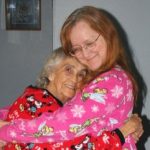
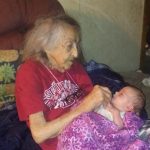
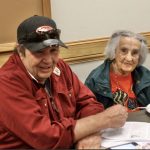 was the kind of woman Aunt Virginia always was.
was the kind of woman Aunt Virginia always was.
Aunt Virginia’s latter years were spent surrounded by her family, living until recently with her son, Steve and his wife, Wanda. There, her family gathered to spend quality time with their mom, and dad, until Bill’s passing on January 17, 2018. There, her sons Steve and Billy, with their families, and her daughter, Betsy, with her children, and her grandchildren talked, laughed, and even cried with their mom as she went through the last days of her life. Most recently, Aunt Virginia needed full-time care, so it was decided that she would move in with Billy and his wife, Janie, who did not work outside the home. That meant that Janie could care for Aunt Virginia’s more full-time needs. Aunt Virginia said of her children and their spouses, “I have been so lucky.” I don’t think is was luck, however. I think that her children and their spouses are simply amazing people who loved their mom/mother-in-law very much, and who would do anything for her.
As my cousin Elmer pointed out to me today, now Aunt Virginia gets to reunite with Bill; her son, Forrest and 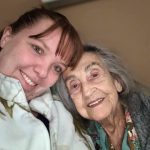
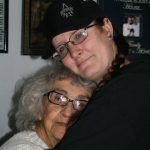 daughter, Christy; her sisters, Evelyn, Delores, and Collene; her brother, Larry; and brothers-in-law, George, Elmer, Allen, and Jack; and of course, her parents, George and Hattie. She leaves behind some good kids and so many she helped to turn their lives around, and for that, she will forever be remembered. Aunt Virginia’s life was full and she was and is loved by all those she touched. No matter how tough things were for her, she would give the shirt off her back to anyone who needed it. That was just the kind of woman she was…a tough one, for sure. Rest in peace now Aunt Virginia. We will love and miss you always.
daughter, Christy; her sisters, Evelyn, Delores, and Collene; her brother, Larry; and brothers-in-law, George, Elmer, Allen, and Jack; and of course, her parents, George and Hattie. She leaves behind some good kids and so many she helped to turn their lives around, and for that, she will forever be remembered. Aunt Virginia’s life was full and she was and is loved by all those she touched. No matter how tough things were for her, she would give the shirt off her back to anyone who needed it. That was just the kind of woman she was…a tough one, for sure. Rest in peace now Aunt Virginia. We will love and miss you always.
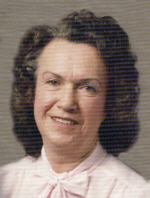
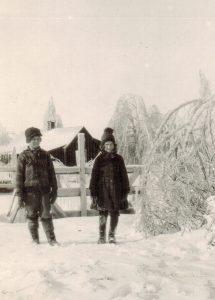 My Aunt Ruth Wolfe was the youngest of the four children of my grandparents, Allen and Anna Spencer. She was born on November 9, 1925 in Duluth, Minnesota. Strange to think that 31 years later, she would get a niece…me, who would be so much like her…in some ways that is. My Aunt Ruth was a very talented woman. She could play any instrument that was set before her, she could paint and do crafts, she loved horses and even raced them, and of course, she was an animal lover…all animals.
My Aunt Ruth Wolfe was the youngest of the four children of my grandparents, Allen and Anna Spencer. She was born on November 9, 1925 in Duluth, Minnesota. Strange to think that 31 years later, she would get a niece…me, who would be so much like her…in some ways that is. My Aunt Ruth was a very talented woman. She could play any instrument that was set before her, she could paint and do crafts, she loved horses and even raced them, and of course, she was an animal lover…all animals.
Aunt Ruth was never really one to want to settle in one place for very long…until she and Uncle Jim moved to the Spokane area, that is. Once they bought their mountain top outside of Newport, Washington, she knew she was home. The family built three cabins on the mountain top, one for Aunt Ruth and Uncle Jim; one for their daughter Shirley Cameron and her husband Shorty; and one for their son, Terry Wolfe. The beauty of the mountain lulled them into a quiet, peaceful life, far away from the hustle and bustle of the California area they had left behind after losing their son, Larry Wolfe to an accidental explosion. Nothing would bring him back, of course, but the peace of the mountain top helped to heal their wounded hearts.
Aunt Ruth and Uncle Jim, while very much at home on their mountain top, never lost their love of the open road, and often took trips to several location, including Casper, Wyoming to visit my family, her brother, Allen Spencer; sister-in-law, Collene; and daughters, Cheryl Masterson, Caryn Schulenberg, Caryl Reed, Alena 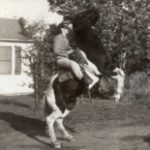
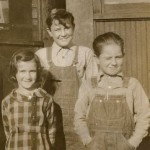 Stevens, and Allyn Hadlock. We loved those visits. Aunt Ruth and Uncle Jim were always lots of fun, and having them in town again was a great treat. They had lived in the Casper area years before, and we were all very sad to see them move away. Those wonderful visits were cut short when Aunt Ruth became ill, and she passed away on May 11, 1992 of Cancer. Today would have been Aunt Ruth’s 94th birthday. Happy birthday in Heaven Aunt Ruth, I know you’re having a great celebration with all the loved ones who have now joined you there. We love and miss you very much.
Stevens, and Allyn Hadlock. We loved those visits. Aunt Ruth and Uncle Jim were always lots of fun, and having them in town again was a great treat. They had lived in the Casper area years before, and we were all very sad to see them move away. Those wonderful visits were cut short when Aunt Ruth became ill, and she passed away on May 11, 1992 of Cancer. Today would have been Aunt Ruth’s 94th birthday. Happy birthday in Heaven Aunt Ruth, I know you’re having a great celebration with all the loved ones who have now joined you there. We love and miss you very much.
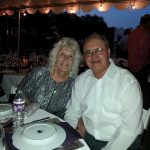 Birthdays are supposed to be happy events, and most are, but the birthdays that come after someone has passed away can be some of the hardest days we will ever spend. Losing a loved one leaves the family with nothing but empty space and memories. The place our loved one once filled with their presence, is now filled only with memories of someone who was, and still is, so important to us. Each first, as it arrives makes the emptiness even more pronounced. The first holiday, birthday, family dinner, or even just the mundane tasks they always helped with, are among the worst days of our new reality, but I think it is the first of those events that will always be viewed as the worst.
Birthdays are supposed to be happy events, and most are, but the birthdays that come after someone has passed away can be some of the hardest days we will ever spend. Losing a loved one leaves the family with nothing but empty space and memories. The place our loved one once filled with their presence, is now filled only with memories of someone who was, and still is, so important to us. Each first, as it arrives makes the emptiness even more pronounced. The first holiday, birthday, family dinner, or even just the mundane tasks they always helped with, are among the worst days of our new reality, but I think it is the first of those events that will always be viewed as the worst.
On October 16, 2019, our uncle, Eddie Hein had a heart attack while working in his 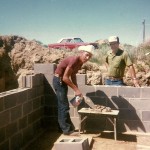 yard. Friends and neighbors, as will as his wife, Pearl and their grandson, Dalton, all tried to help, but it was too late. Eddie was gone, but his memory will be with his many friends and family members forever. Eddie was a sweet man with a heart of gold, who was always willing to help those in need. The people of Forsyth, Montana knew Eddie well. He was a friend to all. He would wave as he drove by, and help when it was needed. Eddie was known around town as someone who could always be counted on, no matter what the need. He was there to give a smile, a hug, a wave, or a hand. Someone said that Eddie was one of God’s great ones, and I agree.
yard. Friends and neighbors, as will as his wife, Pearl and their grandson, Dalton, all tried to help, but it was too late. Eddie was gone, but his memory will be with his many friends and family members forever. Eddie was a sweet man with a heart of gold, who was always willing to help those in need. The people of Forsyth, Montana knew Eddie well. He was a friend to all. He would wave as he drove by, and help when it was needed. Eddie was known around town as someone who could always be counted on, no matter what the need. He was there to give a smile, a hug, a wave, or a hand. Someone said that Eddie was one of God’s great ones, and I agree.
Eddie loved vintage cars, and had his own 55 Chevy that he thoroughly enjoyed. It wasn’t just the cars either, 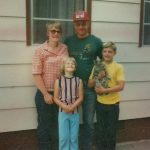 because he loved old tractors too. Eddie loved living next to the Yellowstone River. It was almost like living in the country, and it gave them enough room to have their garden. Eddie could fix just about anything. He loved tinkering around in his shop. If you needed a part for something, there was a good chance that Eddie had it or could make it. He was a great carpenter, and could help build just about anything. Eddie was a bit of a Jock of all trades, and the people of Forsyth counted on him for many things. That is a big part of what makes his passing so sad for everyone, and the only consolation is that since Eddie was a Christian man, we know that we will see him again soon. Happy first Heavenly Birthday Eddie. We love and miss you very much.
because he loved old tractors too. Eddie loved living next to the Yellowstone River. It was almost like living in the country, and it gave them enough room to have their garden. Eddie could fix just about anything. He loved tinkering around in his shop. If you needed a part for something, there was a good chance that Eddie had it or could make it. He was a great carpenter, and could help build just about anything. Eddie was a bit of a Jock of all trades, and the people of Forsyth counted on him for many things. That is a big part of what makes his passing so sad for everyone, and the only consolation is that since Eddie was a Christian man, we know that we will see him again soon. Happy first Heavenly Birthday Eddie. We love and miss you very much.
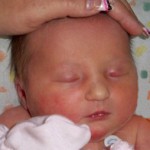
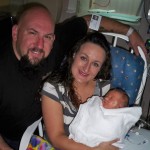 My great grand-niece, Laila Spethman was a sweet little girl, who was a light in her parents’ lives. She was loved by her whole family. Her time on Earth was short…very short…just 18 days, but her impact on all those who loved her will continue. We all look forward to the day when we will see her again, along with all our other loved ones who have gone before us. In many way, we can rejoice for Laila, because she has been someplace and seen things that we cannot, Heaven and most importantly, God. How amazing for Laila, to know the Father and the Saviour. It is a time in our lives that we all look forward to. The time when we are truly home.
My great grand-niece, Laila Spethman was a sweet little girl, who was a light in her parents’ lives. She was loved by her whole family. Her time on Earth was short…very short…just 18 days, but her impact on all those who loved her will continue. We all look forward to the day when we will see her again, along with all our other loved ones who have gone before us. In many way, we can rejoice for Laila, because she has been someplace and seen things that we cannot, Heaven and most importantly, God. How amazing for Laila, to know the Father and the Saviour. It is a time in our lives that we all look forward to. The time when we are truly home.
Still, for Laila, we feel sadness too. Not for her really, but for us. I wonder who she would have been had she stayed here. Would she have been bubbly and ever-changing, like her little sister, Aleesia, who has progressed from being a girly girl, to sometimes wanting to be a bit of a tomboy. I’m sure that has come from having three older brothers, and like all younger children, wanting to be just like the older siblings. I’m sure that Laila would have felt the same way about her brothers, Xander, Zack, and Isaac. For little girls, especially, their older brothers are their role models. Girls often base many of their ideas on what men should be like on their dads and brothers, and Laila would have had some great role models to base her ideas on, because she was loved.
We were all hoping Laila would get to come home with her parents, but that was not to be. Nevertheless, her 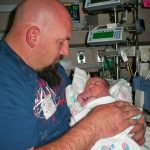
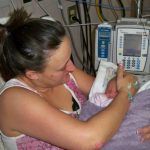 memory will always be with us. Her sweet little face, so dainty and beautiful. Her beautiful eyes, looking at her family with love. She was so cuddly and loved being held by her family. Of course, there were a number of us who didn’t get to see her in this life, but we will always know her when we meet her again in Heaven. And then, we will get to know who she was and is. This life is so short, and while it seems like a long time, it is only a drop in the bucket of time, and then we will get to know Miss Laila Elizabeth Spethman. Happy birthday in Heaven Laila. We already love you even though we don’t know you well…yet.
memory will always be with us. Her sweet little face, so dainty and beautiful. Her beautiful eyes, looking at her family with love. She was so cuddly and loved being held by her family. Of course, there were a number of us who didn’t get to see her in this life, but we will always know her when we meet her again in Heaven. And then, we will get to know who she was and is. This life is so short, and while it seems like a long time, it is only a drop in the bucket of time, and then we will get to know Miss Laila Elizabeth Spethman. Happy birthday in Heaven Laila. We already love you even though we don’t know you well…yet.
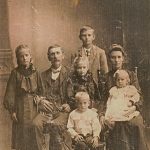
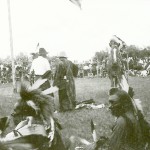 My great grandfather, Cornelius Byer was a kind and a fair man. He was generous and honest. It was these qualities that earned him the respect of the Indian tribes in the Gordon, Nebraska area. Great Grandpa passed away on October 23, 1930, but the celebration of life, really began before the day of the funeral, and even before he passed away. Over the years of his life, my great grandfather became a great friend of the Indians. He was invited to their pow wows, he was asked his opinions on things…and they listened when he spoke. He was helpful to the Indian tribes, and they, in turn treated him with great respect.
My great grandfather, Cornelius Byer was a kind and a fair man. He was generous and honest. It was these qualities that earned him the respect of the Indian tribes in the Gordon, Nebraska area. Great Grandpa passed away on October 23, 1930, but the celebration of life, really began before the day of the funeral, and even before he passed away. Over the years of his life, my great grandfather became a great friend of the Indians. He was invited to their pow wows, he was asked his opinions on things…and they listened when he spoke. He was helpful to the Indian tribes, and they, in turn treated him with great respect.
The Indians would often show up at his home…something that would most likely panic most people. Most often the women and children would stay outside, while the men went in to visit with Great Grandpa. It was another show of respect. The Indians often camped near the house when the men were visiting. I’m sure it was a very interesting lifestyle for my grandmother.
While all that was interesting, probably the most interesting thing happened as Great Grandpa was dying and after his passing. When he lay dying, the Indians came…long lines of them. Each one, including the women and 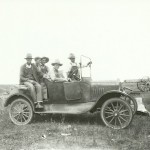
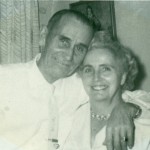 children, passed by his bed. They spoke words of respect and admiration. I’m sure it took hours, but none were turned away. Great Grandma knew how much they loved him, and how much they needed to say goodbye. I would love to have had the chance to see that scene. These were two groups of people who normally didn’t get along, and yet they showed so much love and respect for one another. There was no warring with, no stealing from, no depriving of one another. There was simply love and respect. I’m sure it made my Great Grandmother Edna (Fishburn) Byer and their children feel very safe over the years.
children, passed by his bed. They spoke words of respect and admiration. I’m sure it took hours, but none were turned away. Great Grandma knew how much they loved him, and how much they needed to say goodbye. I would love to have had the chance to see that scene. These were two groups of people who normally didn’t get along, and yet they showed so much love and respect for one another. There was no warring with, no stealing from, no depriving of one another. There was simply love and respect. I’m sure it made my Great Grandmother Edna (Fishburn) Byer and their children feel very safe over the years.
My grandfather, George Byer arrived at the homestead on October 20, 1930. My grandmother, Hattie Byer stayed home with their newborn daughter, Virginia, who was just 4 months old at the time. Grandpa brought almost 2 year old Evelyn with him. His letter at the time said that all the children were there, or soon would be. Three days later, Great Grandpa Cornelius Byer passed away. I’m so glad my grandpa got to see his dad before he passed. When it was time to have the funeral, they would have to travel into Gordon, Nebraska. We would never think of transporting our own loved one to the funeral, but those were different times. Nevertheless, the 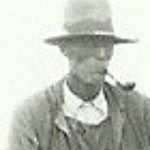
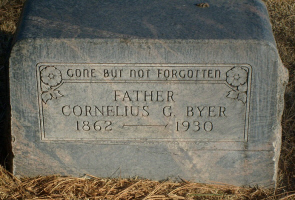 Indians would not leave their dear friend to go alone. With the casket in a wagon, and his son driving, Great Grandpa went to his funeral. Little Evelyn sat in the back of the wagon, wide-eyed in wonder as a long line of Indians followed the procession to the cemetery. In death, as in life, their respect for this man, who was my great grandfather, was on display. I can’t think of a greater honor than this. Cornelius Byer was truly loved and respected by all who knew him.
Indians would not leave their dear friend to go alone. With the casket in a wagon, and his son driving, Great Grandpa went to his funeral. Little Evelyn sat in the back of the wagon, wide-eyed in wonder as a long line of Indians followed the procession to the cemetery. In death, as in life, their respect for this man, who was my great grandfather, was on display. I can’t think of a greater honor than this. Cornelius Byer was truly loved and respected by all who knew him.
 On the first trip I made to Forsyth, Montana with my husband, Bob Schulenberg’s family, I was introduced to his family there…among them, Eddie Hein, Bob’s uncle…his dad’s half-brother. That first trip was followed by yearly trips for many years to come. We loved going up for visits, and we were always made to feel welcome. Eddie was a quiet man…soft spoken, but with a big heart. You always felt accepted by him. Eddie had a great big smile, and a laugh that lit up his face, and he liked to laugh. I will miss his smile, and his big hearted kindness. There was never the formality of calling Eddie and Pearl, uncle and aunt, because they weren’t that much older than many of their nieces and nephews were. Even though we didn’t see them as much lately as we used too, it was always good knowing that he was there. Now, suddenly, Eddie is gone. He passed away yesterday, even though it seemed that his health was improving after his stroke of a few years ago. We will all miss him very much.
On the first trip I made to Forsyth, Montana with my husband, Bob Schulenberg’s family, I was introduced to his family there…among them, Eddie Hein, Bob’s uncle…his dad’s half-brother. That first trip was followed by yearly trips for many years to come. We loved going up for visits, and we were always made to feel welcome. Eddie was a quiet man…soft spoken, but with a big heart. You always felt accepted by him. Eddie had a great big smile, and a laugh that lit up his face, and he liked to laugh. I will miss his smile, and his big hearted kindness. There was never the formality of calling Eddie and Pearl, uncle and aunt, because they weren’t that much older than many of their nieces and nephews were. Even though we didn’t see them as much lately as we used too, it was always good knowing that he was there. Now, suddenly, Eddie is gone. He passed away yesterday, even though it seemed that his health was improving after his stroke of a few years ago. We will all miss him very much.
Bob and I went to Forsyth, two years ago, after his stroke, and I am so glad that we made that trip. It is a trip I will cherish now. Eddie and Pearl, his wife, were both is good spirits, and the trip was so much fun. His mobility was good, even after the stroke, and he seemed just like his old self. I was glad. Pearl just beamed. She was so happy to have him beside her…something I understand after my own husband’s heart attack. You learn to set aside things that don’t matter so much, and live for the day you are in. That’s what Eddie and Pearl were doing too. There were times that Pearl wanted to declutter…we all need to do that from time to time, but  Eddie wanted her to let that go, and just be together. I think I understand where he was coming from, as I’m sure Pearl does too. Stuff can be cleaned out anytime, but time cannot be relived. Memories are always with us, but we have to live them to have them first, to make the memories. Eddie and Pearl lived them.
Eddie wanted her to let that go, and just be together. I think I understand where he was coming from, as I’m sure Pearl does too. Stuff can be cleaned out anytime, but time cannot be relived. Memories are always with us, but we have to live them to have them first, to make the memories. Eddie and Pearl lived them.
They were married on July 15, 1967, and their marriage was blessed with two children, Larry on May 17, 1969; and Kim on June 27, 1971. Life was good. Eddie worked for many years at Peabody Coal in Colstrip, Montana; while Pearl worked at the IGA in Forsyth, until they both retired. This past July they celebrated their 52 wedding anniversary. Eddie and Pearl had a house in Forsyth, Montana, along the Yellowstone River. They raised vegetables, and Pearl canned they every year. Eddie had a garage where he could tinker, and he loved caring for the garden. He was also a capable carpenter. He turned their mobile home into a beautiful house, with a fireplace made from area stone. It was beautiful. Eddie was always willing to help other people with their own projects, including when his brother, Walt Schulenberg, my father-in-law was building his house outside of Casper, Wyoming. As the years passed, Eddie and Pearl became grandparents. They loved their time with those kids, and I’m sure the kids loved the time with them.

It’s hard to believe that Eddie is gone now. There will always be an empty place that belonged to him. I am thankful for the memories of our trips to Forsyth, and the wonderful visits to Eddie and Pearl’s house. I can picture it now, sitting around their table, drinking coffee, and listening to the stories of our lives. It didn’t matter what we talked about…their lives or our lives, we were reconnecting, and that always felt good. I will really miss those times. It saddens me to have the aunts and uncles leaving us. They contribute so much to our lives, and that rich heritage is slipping away with each one who goes home to Heaven. Still, Eddie, like so many others who have gone on before us, is in our future now, not our past. We will see him again. Rest in peace Eddie. We love and miss you already.
 Just like cars, planes have blind spots too. It makes sense, and in reality, the blind spots on planes make the blind spots in cars seem so much less significant. It makes no difference really, because during a crash the result is catastrophic. Of course, there is a better chance, in a collision, to survive in a car than a plane. Of course, it depends on how bad the crash was and where, as to what chances there are of survival in car or plane.
Just like cars, planes have blind spots too. It makes sense, and in reality, the blind spots on planes make the blind spots in cars seem so much less significant. It makes no difference really, because during a crash the result is catastrophic. Of course, there is a better chance, in a collision, to survive in a car than a plane. Of course, it depends on how bad the crash was and where, as to what chances there are of survival in car or plane.
On Monday, September 25, 1978, Pacific Southwest Airlines (PSA) Flight 182 departed Sacramento for San Diego, with a stop in Los Angeles. Flight 182 was a Boeing 727-214 commercial airliner, registration, N533PS. The seven-person, San Diego-based crew consisted of Captain James McFeron, who was 42; First Officer Robert Fox, who was 38; Flight Engineer Martin Wahne, who was 44; and four flight attendants. The flight from Sacramento to Los Angeles went smoothly. At 8:34am, Flight 182 departed Los Angeles. First Officer Fox was the pilot flying. There were 128 passengers on board, including 29 PSA employees. The weather in San Diego that morning was sunny and clear with 10 miles of visibility. It was an ideal day to fly.
At 8:59 a.m., the approach controller alerted the PSA crew about a small Cessna 172 Skyhawk aircraft nearby. 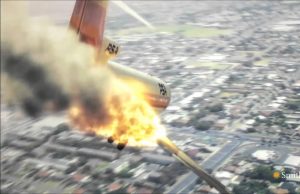 The Cessna was being flown by two licensed pilots. One was Martin Kazy Jr, who was 32. He possessed single-engine, multi-engine, and instrument flight ratings, as well as a commercial certificate and an instrument flight instructor certificate. He had flown a total of 5,137 hours. The other, David Boswell, who was 35. He was a US Marine Corps Sergeant. He possessed single-engine and multi-engine ratings and a commercial certificate. Boswell had flown 407 hours at the time of the accident. He was practicing under Kazy, intent on achieving his instrument rating.
The Cessna was being flown by two licensed pilots. One was Martin Kazy Jr, who was 32. He possessed single-engine, multi-engine, and instrument flight ratings, as well as a commercial certificate and an instrument flight instructor certificate. He had flown a total of 5,137 hours. The other, David Boswell, who was 35. He was a US Marine Corps Sergeant. He possessed single-engine and multi-engine ratings and a commercial certificate. Boswell had flown 407 hours at the time of the accident. He was practicing under Kazy, intent on achieving his instrument rating.
The men in the Cessna had departed from Montgomery Field and were navigating under visual flight rules, which did not require the filing of a flight plan. As is common while learning instrument flying, Boswell was wearing a “hood” to limit his field of vision straight ahead to the cockpit panel, much like an oversized sun visor with vertical panels to block peripheral vision. At the time of the collision, the Cessna 172 light aircraft, registration, N7711G was on the missed approach (in visual meteorological conditions) from Lindbergh’s Runway 9, heading east and climbing. The Cessna was in communication with San Diego approach control. The Cessna came up from below the Boeing 727. The PSA plane failed to keep track of the Cessna, or report losing sight of it when it moved into the blind spot. It was a recipe for disaster. The larger plane virtually ran over the 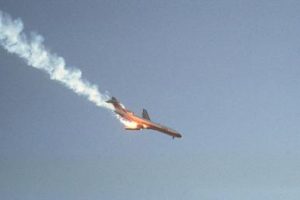 smaller plane over San Diego, California, at 9:01am.
smaller plane over San Diego, California, at 9:01am.
Both aircraft crashed into North Park, a San Diego neighborhood. Flight 182hit a house, and impacted the ground just north of the intersection of Dwight and Nile, killing all 135 people aboard the aircraft and seven people on the ground in houses, including two children. The Cessna impacted on Polk Av between 32nd St and Iowa St killing the two on board. Nine others on the ground were injured and 22 homes were destroyed or damaged by the impact and debris. It was Pacific Southwest Airlines’ first fatal accident.
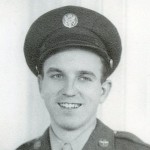
 As I have researched the infantry soldiers of World War II, my thought was that I was really thankful that my dad, Allen Spencer was not one of those men on the ground during the fighting. I felt bad for those men who were on the ground, fighting from the foxholes. I still do, because they were in constant danger. Bombs fall from the sky, and bullets fly from across the battlefield. If those things didn’t kill a soldier, the freezing cold, trench foot, or dysentery from the horribly unsanitary conditions could. It seemed that my dad’s situation was by far safer, but now, I’m not so sure that’s true.
As I have researched the infantry soldiers of World War II, my thought was that I was really thankful that my dad, Allen Spencer was not one of those men on the ground during the fighting. I felt bad for those men who were on the ground, fighting from the foxholes. I still do, because they were in constant danger. Bombs fall from the sky, and bullets fly from across the battlefield. If those things didn’t kill a soldier, the freezing cold, trench foot, or dysentery from the horribly unsanitary conditions could. It seemed that my dad’s situation was by far safer, but now, I’m not so sure that’s true.
The book I had been listening to, that took in World War II from D-Day to The Battle of the Bulge, talked mostly about the ground war, but then at the end, the reader said something that really struck me. It was about the look that crossed the face of a bomber crew’s faces before certain missions…those that would inevitably find the plane flying through flak. The look was one of fear. I knew flak was dangerous, but somehow I didn’t really connect flak with bringing down a plane, or seriously injuring its occupants. Nevertheless, it is quite dangerous for them.
As I researched the dangers of flak, a shocking revelation made itself known. I had written a story about the life expectancy of the ball turret gunner. My findings were that that life expectancy was about 12 seconds. That may be true when one is talking about the prospect of being shot, but when it comes to flak, that cannot be said. Apparently, where flak is concerned, the best place to be is in the plexiglass structure of the ball turret. Plexiglass holds up better against flak than other areas of the plane, so the ball turret gunner is much more protected…at least from flak. The same cannot be said for the bullets flying through the area. I was thankful that my dad was not a ball turret gunner, and that he only filled in as a waist gunner periodically. The waist gunners were in the open, where protection from bullets, and from flak was minimal…at best, non-existent at worst. I can’t imagine how those memories must have affected my dad, but in the book I listened to, the main reason many of the men didn’t want to talk about their experiences in World War II, or any war, was because talking about it brought those memories flooding in again.
After researching flak, and how it works, I can see why the men would get a look of fear on their faces as they prepared to go through areas anti-aircraft weapons shooting flak into the air. Some men said that they could see the red hot glow in the center of the flak, if it was very close. That tells me that it was like a small explosive devise. No wonder it could bring so much damage to a plane. I had known that flak could put holes in the fuselage, but somehow I hadn’t tied that with bringing down a plane. I surmise that it was the B-17 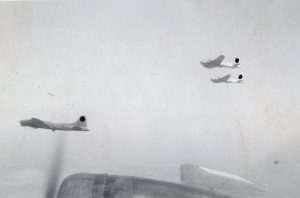
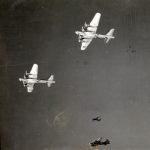 bomber top turret gunner’s daughter in me that wouldn’t allow me to place that danger around my dad. I didn’t want to think about the dangers of his every mission in World War II. My mind seems to have placed his plane in a bubble or a force field, so that no danger could come near him. I think every veteran wonders why they were spared, when others didn’t make it back home. I don’t think anyone can answer that question. As a Christian, I have to credit God for bringing my future dad home.
bomber top turret gunner’s daughter in me that wouldn’t allow me to place that danger around my dad. I didn’t want to think about the dangers of his every mission in World War II. My mind seems to have placed his plane in a bubble or a force field, so that no danger could come near him. I think every veteran wonders why they were spared, when others didn’t make it back home. I don’t think anyone can answer that question. As a Christian, I have to credit God for bringing my future dad home.

